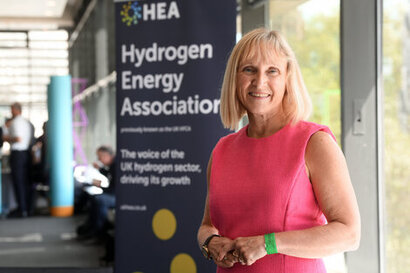
The HEA called for a more “holistic approach” and said the “government must give more foresight to a pragmatic, long-term roadmap that details specifically how NRMM will be supported in achieving the endpoint of Net Zero by 2050.”
In the response, which addresses a series of questions raised by Government, CEO of the HEA Celia Greaves said hydrogen is well suited to the high energy output and flexibility demands of Non-Road Mobile Machinery.
“Both Hydrogen Internal Combustion Engines (ICEs) and fuel cells offer benefits for NRMM decarbonisation” said Ms Greaves. “Whilst ICEs offer reduced initial investment for manufacturers looking to switch from fossil fuels together with zero carbon and minimal NOx emissions, fuel cells offer low operational costs, reliability and zero emissions.”
The response also addressed technical barriers to the implementation of NRMM decarbonization options, arguing that adequate consideration should be given not just to the harsh and unstable material environments in which NRMM operates, but its mobility requirements too.
“Due to these challenging operating conditions, certain technologies, such as Battery Electric and Tethered Electric, may not be suitable for all NRMM applications” the HEA said. “Remote sites, areas with high grid constraints, and construction sites pose issues for the provision of electricity and reduce the viability of electric solutions. Hydrogen solutions are not subject to the same constraints. Unlike other sectors, the intensive operational demands of NRMM usually requires infrastructure to transport fuel to the machine rather than vice versa, and this is challenging in transient environments such as construction. As such, refueling solutions must be flexible and adaptive to support the changing operational demands of NRMM.”
Along with raising concerns, the response made several recommendations to Government including aligning with the EU's inclusion of hydrogen ICE as a zero-emissions technology to avoid disadvantaging UK industries and disincentivizing investment.
The organization also suggested lessons could be taken from both the Netherlands and Norway. The Netherlands has introduced a Subsidy for Clean and Zero Emission Construction Equipment (SSEB), which includes separate funding strands for purchasing, retrofitting, and experimental innovation. In Norway, the Government provides subsidies for the purchase of electric NRMM, which can be as much as 40 percent of the additional cost of the machine compared to the diesel alternative. An incentive scheme like this for hydrogen could help ensure that it achieves its potential in decarbonising NRMM.
The HEA also recommended the Government sponsor dedicated trials of decarbonised NRMM solutions to gather valuable operational data and demonstrate the business case of the technology to the private sector.
“Overall, the Government must recognize that the decarbonisation of NRMM cannot be satisfied by a single technology” the HEA response concluded. “Favoring particular technologies, such as electrification, should be avoided, as this risks undermining other solutions, as well as any new solutions developed in the future To reiterate, a well-functioning decarbonised NRMM sector will include a range of technology options which reflect the specific requirements of NRMM such as durability, flexibility, robustness. Hydrogen solutions are particularly well suited to meet these requirements, and any future Government policy decisions should reflect this.”

